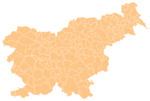- Croats of Slovenia
-
Part of a series of articles on Croats  RecognizedSubgroups
RecognizedSubgroupsThe Croats are an ethnic group in Slovenia. In the 2002 census 35,642 citizens of Slovenia identified themselves as being ethnically Croats,[1] the overall number of Slovenes of Croatian origin is however likely to be much higher.[original research?]
Contents
History
Croats have lived in the Slovene Lands for hundreds of years, as the two neighbouring nations were for centuries part of the same political entities, first the Habsburg Empire and then Yugoslavia. Nevertheless, the number of Croats in the territory of modern Slovenia remained relatively small, as the Slovene Lands were, before the 1950s, a territory of emigration rather than immigration. During most of the history, Croats did not constitute a separate community, as they were mostly single individuals who assimilated to either Slovene, German or Venetian-speaking environments. After World War I, the number of Croats in Slovenia increased significantly, and more numerous communities were present in Ljubljana, Maribor and Celje. In the 1960s, when larger numbers of immigrants from Croatia and Bosnia and Hercegovina settled in Slovenia, the number of Croats increased significantly.
Legal status
Unlike the two historic autochthonous minorities of Slovenia, the Magyars and Italians, the Croats have not been granted the minority status, although they are the second largest ethnic group in Slovenia, after the Slovenes. In the Slovenian legal and constitutional framework, in fact, only the historical minorities who have been living on clearly defined territories for centuries (and the Roma people, who have formed a distinct, although territorially not strictly determined community since at least the 13th century) have the status of a minority, which brings with it several constitutionally guaranteed rights, among which complete visible bilingualism and an autonomous educational system. All other ethnic groups are guaranteed the right to express and develop freely their cultural and linguistic heritage, under the same laws applying to all citizens, but lack the positive discrimination policies applied to the three constitutionally recognized minority communities, as well as the right to have State-sponsored schools in their languages.
In 2006, the Croatian Heritage Foundation along with the Federation of Croatian Societies of Slovenia organized the Week of Slovenian Croats in Zagreb as part of the heritage foundation's annual Croatian minority week.
Numbers
The number of Slovenian citizens of Croatian origin is difficult to establish. According to the 2001 census, 35,642 of them declared themselves as ethnically ("nationally", according to the Slovenian terminology) Croatian. In the same census, around 54,000 people declared Croatian as their mother tongue.[2] Ten years earlier, more than 52,000 Slovenian citizens declared themselves as ethnically Croatian, while the number of those with Croatian as their mother tongue was around 50,000.[2]
It seems however that the great majority of Croats living in Slovenia uses Slovene as their primary language of communication. In 2001, only around 2,700 people spoke either Croatian or a combination of Croatian and Slovene at home, which is a significant decrease from in 1991, when their number was around 10,000.[2]
Number of self-declared ethnic Croats in Slovenia after World War II:
- 1948: 16,069 (1.15%)
- 1953: 17,978 (1.23%)
- 1961: 31,429 (1.97%)
- 1971: 41,556 (2.47%)
- 1981: 53,882 (2.93%)
- 1991: 52,876 (2.76%)
- 2002: 35,642 (1.81%)
Notables personalities
Slovenes of Croatian descent include:
- Ivo Brnčić, literary critic
- Izidor Cankar, essayist, art historian, translator and diplomat (Croatian-German mother);
- Angelo Cerkvenik, playwright and translator (Croatian mother);
- Slavko Ivančić, pop singer;[3]
- Željko Ivanek, actor;
- Ivica Jurković, basketball player (born in Herzegovina, Croatian parents);
- Jelko Kacin, politician (Croatian mother);
- Jurij Kocbek, photographer and designer (Croatian mother);[4]
- Matjaž Kocbek, poet (Croatian mother);[4]
- Srečko Katanec, football player and coach (Croatian mother);
- Tonči Kuzmanić, political theorist;
- Miljenko Licul, designer;
- Ivan Mamić, politician (New Slovenia);
- Tino Mamić, journalist and editor (Croatian father);
- Dragutin Mate, politician and diplomat;
- Nenad Miščević, philosopher;[5]
- Ciril Ribičič, jurist and politician;
- Josip Ribičič, writer; (Croatian father)
- Mitja Ribičič, Communist official and politician;
- Goran Sankovič, football player;
- Roko Žarnić, politician, Slovenian Minister of Environment and Spacial Planning (Croatian father);[6]
- Oton Župančič, poet and translator (Croatian mother).
People of Croatian origin who were born or lived in Slovenia include:
- Alan Hranitelj, costumographer;
- Željko Ivanek, actor;
See also
References
- ^ http://www.stat.si/popis2002/en/rezultati/rezultati_red.asp?ter=SLO&st=7
- ^ a b c http://www.stat.si/popis2002/gradivo/2-169.pdf
- ^ http://www.dogaja.se/opis/slavko_ivancic/12492
- ^ a b Andrej Inkret, "Edvard Kocbek, življenje in delo" in Edvard Kocbek, Pričevanje (Ljubljana: Mladinska knjiga, 1999), 388.
- ^ http://www.katedra-on.net/index.php?option=com_content&task=view&id=251&Itemid=77
- ^ dalje.com/hr-svijet/roko-zarnic--nisam-hrvatski-agent/293508
External links
Croatian diaspora Europe Americas Oceania  Ethnic groups in Slovenia
Ethnic groups in Sloveniaaccording to the 2002 Slovenian Census Over 20,000 people Slovenians (1,631,363) · Serbs (38,964) · Croats (35,642) · Bosniaks (21,542)
Under 20,000 people Hungarians (6,242) · Albanians (6,186) · Macedonians (3,972) · Roma (3,246) · Montenegrins (2,686) · Istrian Italians (2,258)
Categories:- Croatian diaspora
- Ethnic groups in Slovenia
Wikimedia Foundation. 2010.

